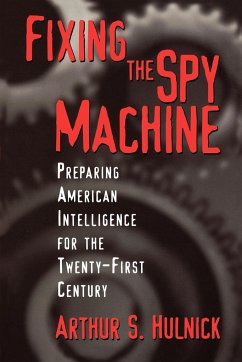With the end of the Cold War and the dawning of a new century, the U.S. intelligence system faces new challenges and threats. The system has suffered from penetration by foreign agents, cutbacks in resources, serious errors in judgment, and what appears to be bad management; nonetheless, it remains one of the key elements of America's strategic defense. Hulnick suggests that things are not as bad as they seem, that America's intelligence system is reasonably well prepared to deal with the many threats to national security. He examines the various functions of intelligence from intelligence gathering and espionage to the arcane fields of analysis, spy-catching, secret operations, and even the business of corporate espionage. Hulnick offers a variety of ideas for making the system work better and for attracting the kinds of new intelligence professionals who will build a stronger intelligence system in the next century. Fixing the Spy Machine suggests that the role of the Director of Central Intelligence, the person who runs both the CIA and oversees the U.S. Intelligence Community, should be depoliticized and made stronger. It also concludes that people are responsible for making the system function, not its bureaucratic structure. Still, intelligence managers are going to have to become less risk-averse and more flexible if the system is to function at its best.
Hinweis: Dieser Artikel kann nur an eine deutsche Lieferadresse ausgeliefert werden.
Hinweis: Dieser Artikel kann nur an eine deutsche Lieferadresse ausgeliefert werden.








